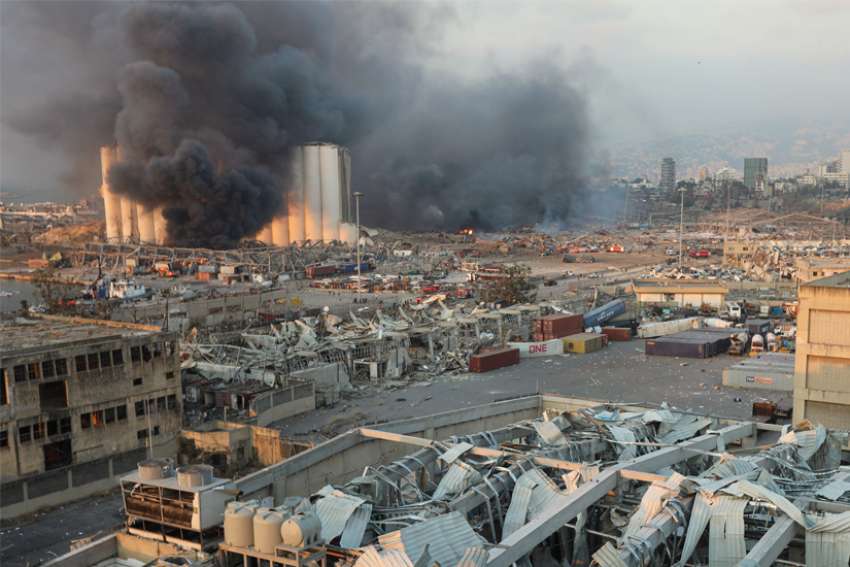On Aug. 10, Lebanon’s government resigned over the Aug. 4 blasts at the Beirut port, a decision that was made under pressure as several ministers quit or expressed their intention to step down.
But observers believe that the changes many Lebanese demand to reform their political system could require a new electoral law, changes to the constitution and dismantling the sectarian-based system that has ruled Lebanon for decades.
The explosions — caused by the detonation of 2,750 tons of ammonium nitrate stored in a port warehouse for six years without safety measures — killed at least 163 people and injured 6,000. Shockwaves were felt more than 200 kilometres away.
After the explosions, grief-stricken and furious Lebanese took to the streets, battling rubber bullets and tear gas to demand their government’s dismissal over inaction and incompetence. A security official was killed as protesters stormed various government ministries.
“They’ve taken our money. They’ve taken our pride. We’ve had enough and we’re not going anywhere,” said one demonstrator, named Aline.
Protesters want aid to rebuild the country only to reach the people, without government cronyism.
Vast areas of the capital have been destroyed, leaving 300,000 people homeless, including 80,000 children, according to UNICEF. It’s estimated that $15 billion will be needed in the short term to fix damages and aid the homeless in a city now in tatters and turmoil.
Other Lebanese formed armies of volunteers, sweeping up shards of glass from destroyed buildings. They also rescued the belongings of families whose homes are no longer safe to live in, delivered first aid and food as well as prayed for consolation with those traumatized by tremendous loss.
In his Aug. 9 sermon, Lebanon’s powerful Catholic cleric, Cardinal Bechara Rai, Maronite patriarch, lent his voice to the popular rising tide against political leaders, many of whom were warlords from Lebanon’s 1975-1990 civil war.
He called for the Cabinet to resign, saying it cannot “change the way it governs” the country, once known as the “Switzerland of the Middle East,” now ravaged by corruption, financial mismanagement, soaring poverty and hyperinflation.
“The resignation of an MP or a minister is not enough ... the whole government should resign as it is unable to help the country recover,” Rai said, adding that angry demonstrations exhibited “the impatience of those who are oppressed.”
He also called for an international investigation into the deadly blast and expressed his “deep condolences to the families of the Lebanese martyrs and hope for a speedy recovery for the wounded,” according to his remarks reported by Lebanon’s National News Agency.
French President Emmanuel Macron has led the charge mobilizing international assistance, first bringing planes carrying equipment, rescue workers and investigators Aug. 6, then hosting an international donors meeting that raised $297 million. Canada has offered $30 million in humanitarian assistance.
Neighbouring Jordan sent medical workers to set up field hospitals around the blast site as Lebanon’s health care system was already heaving under the pressure of COVID-19 patients and tending some of the injured. King Abdullah II has sent rescue teams, medical aid and food, joining dozens of other countries providing assistance.
Pope Francis donated 250,000 euro ($384,000) as initial aid to assist the Church in Lebanon’s difficulty and suffering.
He made an emotional appeal during his Aug. 9 Angelus to the “bishops, priests and religious of Lebanon to be close to the people and to live a style of life marked by evangelical poverty, without luxury, because your people are suffering, suffering a lot.”
Acknowledging the fragility of co-existence in the multi-sectarian nation at this time, Pope Francis said he is nonetheless praying “that, with God’s help, and everyone’s genuine participation, (Lebanon) may be reborn free and strong.”
International Catholic aid agencies also began helping and collecting money.
The 18 or more distinct religious groups is “something very rich for us,” said Karim Makdisi, who teaches at the American University of Beirut about Lebanon’s historic model of co-existence.
“The diversity is a huge plus for us. It is something that we need to rebuild as fundamentally part of Lebanon as we move forward, but taking it away from those politicians internationally and locally who use it for their own benefit, patronage, clientelism and bleeding the country as parasites, and transform it into something more positive that we can build,” Makdisi said, commenting on the need to overhaul Lebanon’s political system.
Relief efforts
As part of its $30-million commitment toward humanitarian assistance in Lebanon, the Canadian government announced it would match up to $5 million in individual donations made between Aug. 4-24 to the 12 organizations in the Humanitarian Coalition.
Development and Peace–Caritas Canada is represented on the board of the Canadian Food Grains Bank — one of the 12. Because of this relationship, donations to Development and Peace will be eligible for matching funds. Those contributions go directly to Development and Peace partners in Lebanon, including Caritas Lebanon. Online donations can be made at www.devp.org.
The Catholic Near East Welfare Association, which has offices in Beirut, is also taking donations.
Canadian Jesuits International are collecting funds to support Fr. Corrou’s team in Beirut.
The Archdiocese of Toronto is accepting donations through its humanitarian relief page.


